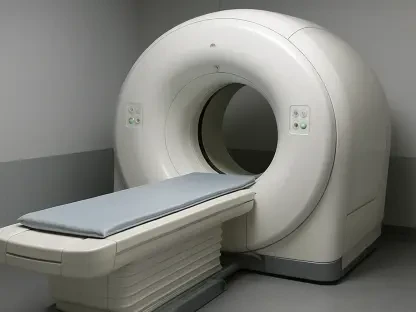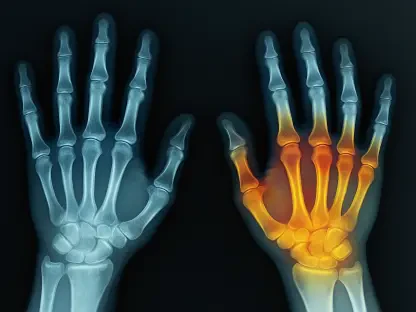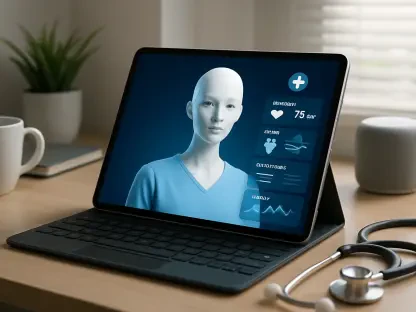In an era where technology is reshaping every facet of healthcare, a quiet revolution is unfolding in specialty medical practices, particularly at Halcyon Dermatology under the stewardship of Dr. Kathy Lee. The introduction of ambient artificial intelligence (AI) through ModMed Scribe, a cutting-edge documentation tool tailored for dermatology, is redefining how specialists manage their demanding workloads. This innovative system is not just a technological upgrade but a lifeline for physicians drowning in administrative tasks, allowing them to refocus on what truly matters—patient care. By capturing clinical interactions in real time and seamlessly integrating with existing systems, this AI solution addresses long-standing inefficiencies that have plagued specialty care. The transformation at this dermatology practice offers a compelling case study for how targeted technology can alleviate burdens, improve patient experiences, and streamline operations, setting a precedent for other medical fields grappling with similar challenges.
Overcoming Documentation Challenges in Specialty Care
The administrative weight of clinical documentation has long been a thorn in the side of specialty care providers, sapping time and energy that could be better directed toward patients. At Halcyon Dermatology, Dr. Kathy Lee encountered this struggle daily, often spending late nights reconstructing detailed patient encounters after grueling clinic hours. The mounting pressure for meticulous charting exacerbated delays, creating bottlenecks that slowed down the entire practice. This relentless cycle not only drained productivity but also risked diminishing the quality of care, as attention was diverted from meaningful patient interactions to endless paperwork. The challenge was clear: a solution was needed to break free from the grip of inefficient documentation processes that hindered the ability to prioritize patient well-being over administrative demands.
Compounding this issue was the inadequacy of generic AI tools that failed to meet the nuanced demands of dermatology. These systems frequently misinterpreted specialized terminology and treatment protocols unique to the field, resulting in errors that required additional time for corrections. For Dr. Lee and her team, this meant double-checking notes and reworking documentation, further intensifying the administrative strain. The realization dawned that only a technology deeply attuned to the specific language and workflows of dermatology could truly alleviate these burdens. This gap in generic solutions underscored the urgent need for a tailored approach, one that could understand the intricacies of specialty care and deliver accurate, reliable support without adding to the workload.
Revolutionizing Workflows with Tailored Technology
ModMed Scribe has emerged as a transformative force at Halcyon Dermatology, offering a customized AI solution designed explicitly for the field of dermatology. Unlike off-the-shelf systems, this tool employs ambient listening to capture clinical conversations as they happen, generating comprehensive visit notes in real time. This allows physicians to maintain full engagement with patients during consultations without the distraction of manual note-taking. Moreover, its seamless integration with the clinic’s electronic health record (EHR) system eliminates the tedious task of redundant data entry, ensuring that patient charts are updated instantly. This synergy between technology and existing infrastructure has redefined operational efficiency, proving that specialty-specific AI can address pain points with precision and effectiveness.
The impact of this technology extends beyond mere documentation to reshape staff training dynamics within the practice. Previously, onboarding new hires was a lengthy process, often taking months for them to master complex documentation workflows. With ModMed Scribe in place, training time has been drastically reduced, enabling new staff members to achieve proficiency in mere weeks. This rapid adaptation frees them to focus on patient interaction rather than getting bogged down by administrative tasks. The result is a more confident and agile team, capable of delivering high-quality care without the lingering stress of mastering cumbersome systems. This shift highlights how targeted AI can empower staff, fostering a workplace environment where patient care takes precedence over paperwork.
Elevating Patient Care and Operational Gains
One of the most profound benefits of adopting ModMed Scribe at Halcyon Dermatology is the enhancement of the patient experience through immediate access to detailed notes. Front office staff can now promptly address follow-up inquiries or provide tailored product recommendations at checkout, thanks to scribe-generated records available right after visits. This efficiency minimizes delays that once frustrated patients awaiting clarification on treatment plans. By fostering smoother communication and quicker responses, the technology builds trust and satisfaction among patients, reinforcing the practice’s commitment to exceptional care. This improvement demonstrates how AI can bridge gaps in patient-provider interactions, creating a more seamless and responsive healthcare journey.
On the operational front, the reduction in post-visit documentation time stands out as a game-changer, shrinking from several hours to under an hour. Real-time data capture ensures a high level of accuracy, cutting down on errors that previously plagued patient records. This newfound efficiency allows more time for direct patient care, addressing a core concern for specialists overwhelmed by administrative duties. Additionally, billing processes have seen remarkable improvement, with the AI suggesting precise procedure details and appropriate codes, leading to fewer claim rejections and faster reimbursement cycles. Such advancements not only bolster the clinic’s cash flow but also reduce administrative overhead, showcasing the far-reaching financial benefits of integrating specialty-specific technology into daily operations.
Guidance for Broader Adoption in Specialty Fields
For other specialty practices considering AI solutions, the journey at Halcyon Dermatology offers critical lessons on navigating this technological shift. A primary takeaway is the importance of selecting a system explicitly trained in the clinical language and workflows of the specific field. Generic tools often fall short, creating more hurdles than solutions due to their inability to grasp specialized nuances. Thorough pilot testing, particularly with complex cases, is recommended to ensure the technology can handle intricate diagnoses and multi-step procedures effectively. This cautious approach helps validate the AI’s capability to support the unique demands of a practice, setting the stage for a successful rollout without disrupting patient care.
Another vital piece of advice centers on evaluating the broader impact of AI on workflow integration and scalability. The ideal solution should mesh effortlessly with existing systems, minimizing processing steps and administrative tasks. Practices must also consider how the technology will adapt to future advancements and support long-term goals, such as reducing healthcare delivery costs. By focusing on seamless integration and forward-looking adaptability, specialists can maximize the benefits of AI, ensuring it enhances rather than complicates operations. The experience at Halcyon Dermatology serves as a blueprint, illustrating how careful selection and strategic implementation can transform specialty care, paving the way for improved efficiency and patient outcomes across diverse medical disciplines.
Reflecting on a Milestone in Healthcare Innovation
Looking back, the integration of ModMed Scribe at Halcyon Dermatology marked a pivotal moment in addressing the entrenched challenges of administrative overload in specialty care. Under Dr. Kathy Lee’s leadership, the practice not only slashed documentation time but also uplifted staff training, patient satisfaction, and financial efficiency through this tailored AI solution. The success story underscored the necessity of technology that speaks the language of specific medical fields, offering a model for others to emulate. Moving forward, specialty practices are encouraged to prioritize solutions that align with their unique needs, conduct rigorous testing, and ensure compatibility with current systems. By taking these steps, the healthcare industry can continue to harness ambient AI to alleviate provider burdens, ultimately enhancing the quality of care delivered to patients and setting a new standard for operational excellence.









